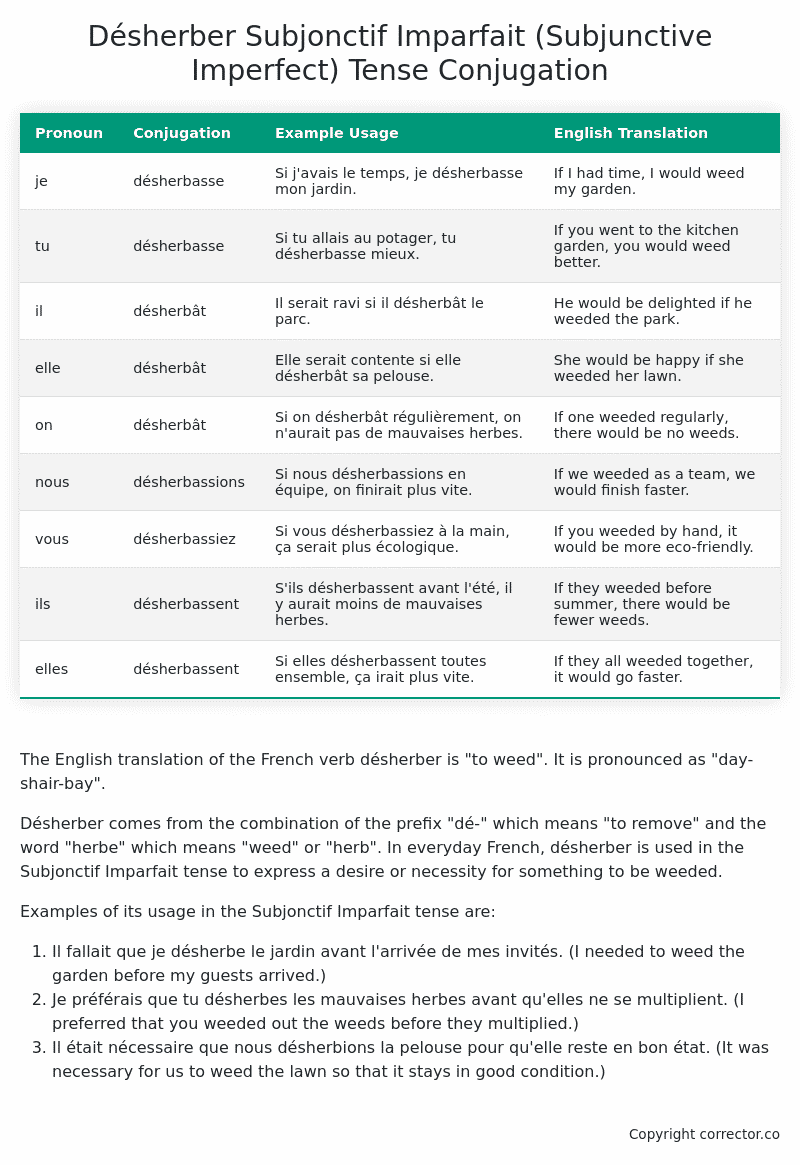Subjonctif Imparfait (Subjunctive Imperfect) Tense Conjugation of the French Verb désherber
Introduction to the verb désherber
The English translation of the French verb désherber is “to weed”. It is pronounced as “day-shair-bay”.
Désherber comes from the combination of the prefix “dé-” which means “to remove” and the word “herbe” which means “weed” or “herb”. In everyday French, désherber is used in the Subjonctif Imparfait tense to express a desire or necessity for something to be weeded.
Examples of its usage in the Subjonctif Imparfait tense are:
- Il fallait que je désherbe le jardin avant l’arrivée de mes invités. (I needed to weed the garden before my guests arrived.)
- Je préférais que tu désherbes les mauvaises herbes avant qu’elles ne se multiplient. (I preferred that you weeded out the weeds before they multiplied.)
- Il était nécessaire que nous désherbions la pelouse pour qu’elle reste en bon état. (It was necessary for us to weed the lawn so that it stays in good condition.)
Table of the Subjonctif Imparfait (Subjunctive Imperfect) Tense Conjugation of désherber
| Pronoun | Conjugation | Example Usage | English Translation |
|---|---|---|---|
| je | désherbasse | Si j’avais le temps, je désherbasse mon jardin. | If I had time, I would weed my garden. |
| tu | désherbasse | Si tu allais au potager, tu désherbasse mieux. | If you went to the kitchen garden, you would weed better. |
| il | désherbât | Il serait ravi si il désherbât le parc. | He would be delighted if he weeded the park. |
| elle | désherbât | Elle serait contente si elle désherbât sa pelouse. | She would be happy if she weeded her lawn. |
| on | désherbât | Si on désherbât régulièrement, on n’aurait pas de mauvaises herbes. | If one weeded regularly, there would be no weeds. |
| nous | désherbassions | Si nous désherbassions en équipe, on finirait plus vite. | If we weeded as a team, we would finish faster. |
| vous | désherbassiez | Si vous désherbassiez à la main, ça serait plus écologique. | If you weeded by hand, it would be more eco-friendly. |
| ils | désherbassent | S’ils désherbassent avant l’été, il y aurait moins de mauvaises herbes. | If they weeded before summer, there would be fewer weeds. |
| elles | désherbassent | Si elles désherbassent toutes ensemble, ça irait plus vite. | If they all weeded together, it would go faster. |
Other Conjugations for Désherber.
Le Present (Present Tense) Conjugation of the French Verb désherber
Imparfait (Imperfect) Tense Conjugation of the French Verb désherber
Passé Simple (Simple Past) Tense Conjugation of the French Verb désherber
Passé Composé (Present Perfect) Tense Conjugation of the French Verb désherber
Futur Simple (Simple Future) Tense Conjugation of the French Verb désherber
Futur Proche (Near Future) Tense Conjugation of the French Verb désherber
Plus-que-parfait (Pluperfect) Tense Conjugation of the French Verb désherber
Passé Antérieur (Past Anterior) Tense Conjugation of the French Verb désherber
Futur Antérieur (Future Anterior) Tense Conjugation of the French Verb désherber
Subjonctif Présent (Subjunctive Present) Tense Conjugation of the French Verb désherber
Subjonctif Passé (Subjunctive Past) Tense Conjugation of the French Verb désherber
Subjonctif Imparfait (Subjunctive Imperfect) Tense Conjugation of the French Verb désherber (this article)
Subjonctif Plus-que-parfait (Subjunctive Pluperfect) Tense Conjugation of the French Verb désherber
Conditionnel Présent (Conditional Present) Tense Conjugation of the French Verb désherber
Conditionnel Passé (Conditional Past) Tense Conjugation of the French Verb désherber
L’impératif Présent (Imperative Present) Tense Conjugation of the French Verb désherber
L’infinitif Présent (Infinitive Present) Tense Conjugation of the French Verb désherber
Struggling with French verbs or the language in general? Why not use our free French Grammar Checker – no registration required!
Get a FREE Download Study Sheet of this Conjugation 🔥
Simply right click the image below, click “save image” and get your free reference for the désherber Subjonctif Imparfait tense conjugation!

Désherber – About the French Subjonctif Imparfait (Subjunctive Imperfect) Tense
Formation
Common Everyday Usage Patterns
Interactions with Other Tenses
Subjonctif Présent
Indicatif Passé Composé
Conditional
Conditional Perfect
Summary
I hope you enjoyed this article on the verb désherber. Still in a learning mood? Check out another TOTALLY random French verb conjugation!


